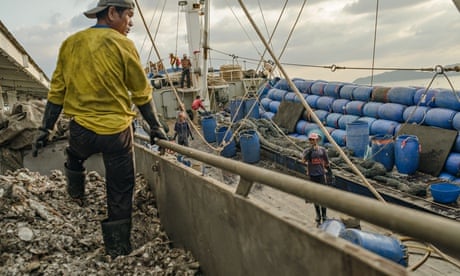Slave labour should be consigned to the history books. Yet the globalisation of supply chains and the relentless downward pressure on prices means that exploitation of the vulnerable still exists.
The Guardian's revelations that the Thai fish industry – and in particular the supply of prawns to UK supermarkets – has been implicated in the use of slave labour is the latest scandal to have rocked public perception of our food system. The resulting inquests, investigations and questions in Parliament show there are still more surprises to be found in the supply chains that end on our plates.
Alongside the moral concerns, food companies also have their reputations to consider. Once a product becomes marred with the taint of slavery, the exploitation of a vulnerable group (such as Bangladeshi garment workers) or a lack of welfare provisions for animals (such as battery chickens), it is difficult to shake off.
In a globalised world, being certain that your supply chain is free from suppliers that operate in breach of the law is increasingly complex. The reality is that an end producer may not know who its subcontractors are or what practices they employ. Even where a direct contractual relationship exists, it can be difficult to ensure applicable standards are complied with. So, how can you ensure you aren't contracting with a criminal?
While most organisations would not seek an unethical and damaging supplier, below are some tips to ensure you are proactively researching, reviewing and revising your supply chain.
1. Research
Carry out due diligence or incorporate HACCP (Hazard Analysis Critical Control Point) assessment principles into the entire supply chain, exploring risks and vulnerabilities and how these can be best protected against. These checks are usually designed to identify hazards (such as deterioration) and lessen the risk of these occurring (such as checks on temperature control) within the production and distribution chain, but can and should be applied more broadly.
Particular care should be observed if suppliers are located in high-risk jurisdictions or connected with sectors particularly vulnerable to exploitation, such as China, as evidenced in the melamine in milk crisis. When assessing the jurisdictions you operate in, consider what the reporting, regulatory or licensing obligations of that country are, and whether your company requires a higher standard. Investigate whether those standards are being met, rather than relying on regulation alone – as seen in the Bangladesh tragedy where certain obligatory workplace permits were not obtained.
2. Review
Perform an audit of supply contracts and, if necessary, gradually vary supply terms to improve provisions, commitments and standards by inserting specific clauses and conditions to be adhered to. You need to investigate what confirmation you receive from suppliers, that their specific reporting, regulatory or licensing obligations are adhered to, and confirm your role in supporting this process. Is this just a box ticking confirmation, or are copies of underlying audits or licences provided?
Lengthier supply chains require consistent standards of investigation and auditing at all levels. A greater degree of micro-management for the key contracts may be required, such as written reports and face-to-face or virtual meetings with suppliers.
3. Revise
Environmental, political or market conditions regularly change and, when they do, companies need to be keenly aware of the pressures suppliers may be under and what the resulting risks are likely to be. This can range from a harvest being adversely affected by weather conditions to contamination increasing consumer demand for an alternative food. It could be argued that the horsemeat scandal, for example, was caused in part by the cheaper prices of a similar commodity and the low risk of detection.
Purchasing arrangements need to be regularly compared to the market rate, and if they are significantly below this, the knock-on effects to suppliers should be investigated. At the very top of an organisation, support needs to be provided throughout the costly and complex process of investigations and audits. Transparency will be rewarded in the long run, and there shouldn't be a fear of sharing the negatives as well as the positives.
4. Going beyond the bare minimum
While over the next five years it is expected that additional reporting requirements and procurement rules will be introduced, the law generally imposes no duty on a company to prevent a third party from causing damage to another. This means that currently, the scrutiny of the actions of your supplier, beyond what they are contracted with you to supply, are in the realms of corporate social responsibility.
Going above and beyond the basic rules, truly interrogating your supply chain, pre-empting cumbersome legislation and taking voluntary action should be the target of any forward-thinking brand. The positive outcomes of good corporate etiquette and responsibility can be seen in the success of organisations such as Innocent, Green & Black's and Ella's Kitchen.
Not all organisations can carry the Fairtrade logo, but they should be aware of the dangers of failing to effectively research, review and revise their practices. Reputational damage can be mitigated by a strong supply chain that has buy-in at all levels – and, while auditing and contract management may seem costly and intrusive, it will provide your organisation with much needed cover from a hugely expensive and damaging scandal.
The recent exposé of the fishing industry should come as a warning that shocking practices can unwittingly occur under a brand's name. Companies should take note and be diligent in ensuring we don't see such revelations again.
Jessica Burt is a food law solicitor at national law firm Mills & Reeve.
The supply chain hub is funded by Fairtrade Foundation. All content is editorially independent except for pieces labelled advertisement feature. Find out more here.
Join the community of sustainability professionals and experts. Become a GSB member to get more stories like this direct to your inbox







Comments (…)
Sign in or create your Guardian account to join the discussion